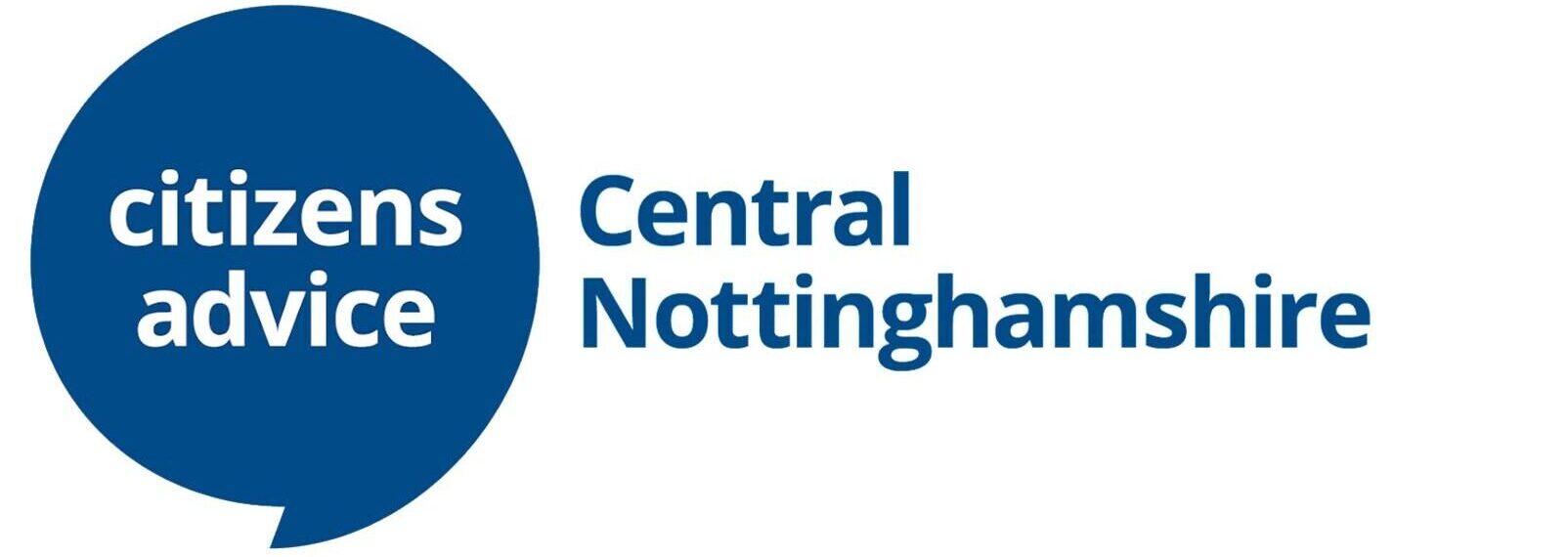Executive summary
This is the first impact report since the merger of Citizens Advice services in Ashfield, Broxtowe and Newark & Sherwood. It is a shortened version of our usual impact report as we felt the most important task at this stage was to set a benchmark of the combined services at the point of merger. The timeframe for the report (April 2023 – March 2024) in fact crosses the point of legal merger that took place in January 2024. It has not been possible to produce a calculation social return on investment at this point, something we will produce in the next impact report.
In summary the combined organisations achieved the following outputs and outcomes last year;

After evaluation our combined outputs in the three districts is significant helping over 15,000 people with 55,000 problems and generating new income worth close to £7 million. We reach people who are the most vulnerable in our society but especially those who experience poor health or who are economically excluded.
Our clients tell us that we achieve system change for them with long lasting outcomes that keep them out of crisis and benefit their wellbeing. Improvements to people’s financial resilience is particularly noticeable with clients telling us that we increase their income, reduce spending and help them feel more secure in their homes.
We can only achieve what we do by working closely with other stakeholders. They tell us that we help them with their strategic priorities but that is a mutual outcome. Our partners help us secure the best for our clients through holistic partnership working. However, we remain independent and impartial fighting for the best outcome for our clients whilst recognising that this is usually a shared objective.
Our contribution to better health
There is a strong link between our outcomes and many of the building blocks of health. That is good housing, good work, skills, education and feeling supported. With so many of our clients experiencing poor health (54%) we strive to make our contribution to better health in Central Nottinghamshire.
Our contribution to the economy
In addition to our impact towards health priorities in Central Nottinghamshire we also make a modest contribution to the local economy, not only by putting money in peoples’ pockets and improving their financial wellbeing and sometimes increasing economic activity but also by attracting investment into Nottinghamshire. This year, in addition to our core grants from local government we secured £923,305 in terms of grants and contracts. This allows us to employ around 40 full-time equivalent post, all contributing to government revenues and the local economy.
The report in detail
Outputs

The service was able to help 15,333 unique individuals with the problems they faced. This totalled 55,4512 problems and at an average of 3.6 problems per client represents the highest average number of problems per client that we have ever experienced. We think there are two factors behind this. The first is the cost-of-living crisis has increased people’s vulnerability to crisis requiring our help. Put in simple terms the 50% of households in a budget deficit presenting to Citizens Advice has a knock on effect on families and relationships, housing and debt.
The second factor is the way we have been designing our services in Central Nottinghamshire over recent years. Our outcomes approach to delivering advice services to meet the needs of the most vulnerable clients with severe and multiple problems or those whom face financial exclusion means that we are supporting more people with complex needs, something we are very proud of. Our proactive advice model is changing lives.
Our work to maximise income produced economic gains for clients totalling almost £6.9 million pounds. This is a staggering figure that shows the economic reach of our service. These gains include previously unclaimed or new claims for welfare benefits, one-off charitable grants and payments, reimbursements and compensation claims.
Our clients come from across the age range but what is noticeable is the high number of people with a long-term health problem or a disability (54%). This is why we work closely with our partners in health.
It is also noticeable that more women (58%) than men seek our help. This is sometimes the opposite for some of our specialist projects particularly our Early Intervention Workers who see more men than women.
Our clients come from across the age range but what is noticeable is the high number of people with a long-term health problem or a disability (54%). This is why we work closely with our partners in health.
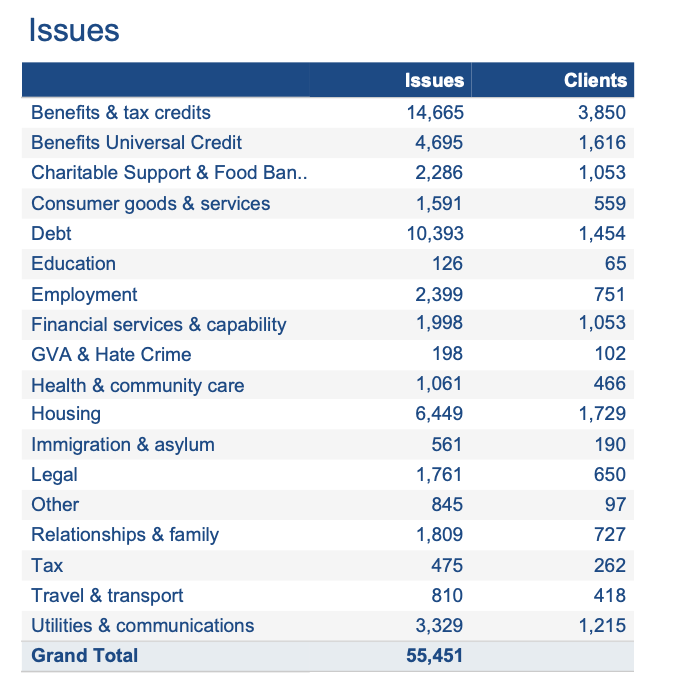
It is also noticeable that more women (58%) than men seek our help. This is sometimes the opposite for some of our specialist projects particularly our Early Intervention Workers who see more men than women.
Since the cost-of-living crisis we have also noticed that the majority of our clients’ debts have been priority debts, the most common being council tax and fuel debts. Our clients are struggling with their basic liabilities and putting food on the table rather than accumulating consumer debts. That is why we have seen a significant increase in the number of people we help to access charitable relief (1,053).
As in previous years our greatest number of enquiries (issues) relate to welfare benefits, housing and debt. We have seen an increase in the number of people we help through financial capability work which forms part of our Financial Resilience Programme, those needing help with utilities and as stated above help with charitable support and foodbanks.
Outcomes
Each year we carry out a client survey that seeks to explore what are the long-term outcomes for our clients in terms of ability to access advice at an early stage before a crisis emerges and their perceived ability to self-manage problems in the future.
We also assess any improvement in the client’s wellbeing, their feelings of being more supported, less isolated and increased optimism about the future. We have developed a self-scoring mechanism that allows us to measure a percentage of improvement in these areas after receiving help and advice from the service.
During 2023/24 we surveyed 214 clients and they told us;
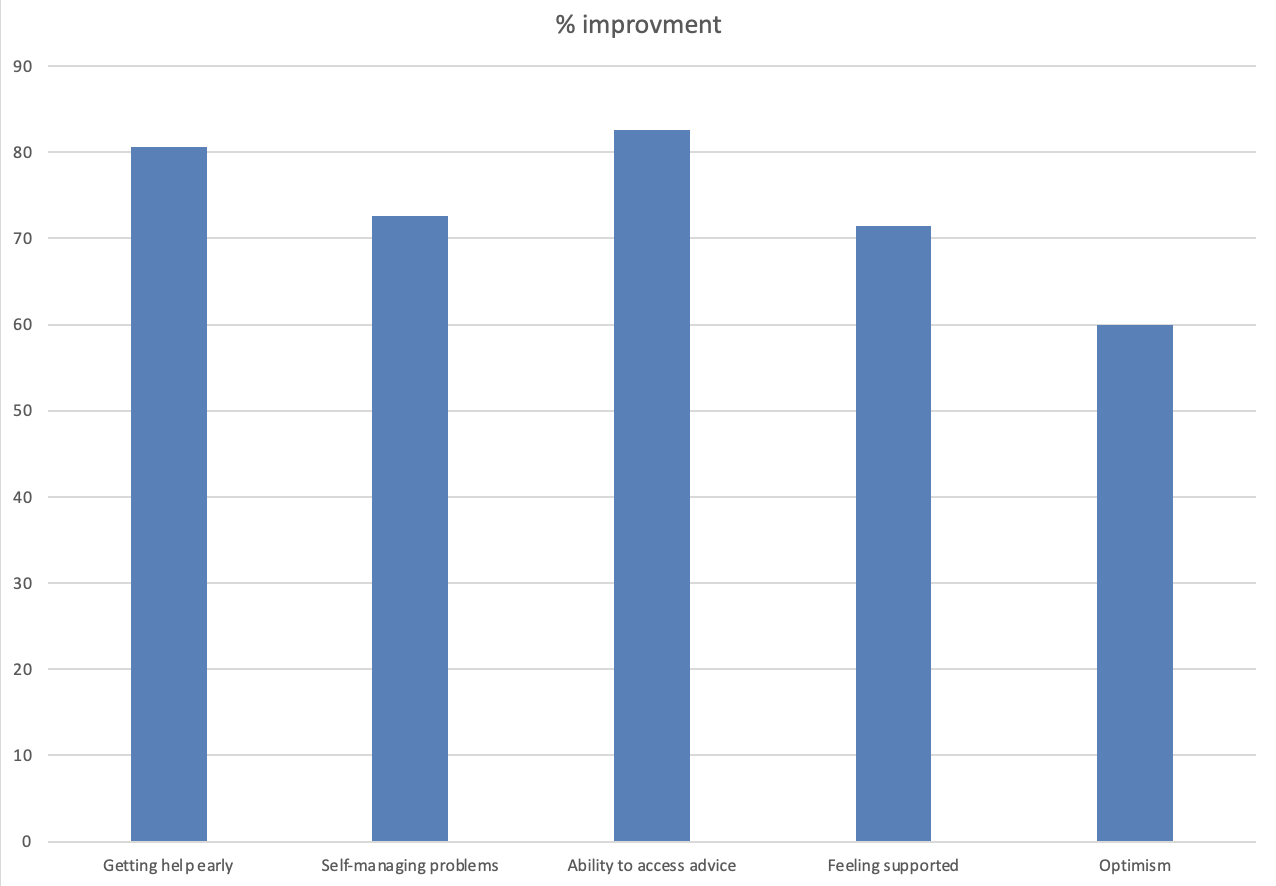
Managing problems
What we observe from the results is that Citizens Advice services in Central Nottinghamshire increase peoples’ ability to keep out of crisis. Either by becoming better able to manage problems or at least know when and how to access advice early before a crisis emerges. We can see from the chart that the average improvement in our clients’ ability to self-manage problems increases by over 70% and if they need help they are better able to access help early by 80%.
Wellbeing outcomes
We are also pleased to report that people feel a sense of improved mental wellbeing as a result of the service they receive. They tell us they feel more supported and less isolated (over 70%) and have an increased feeling of optimism about the future (60%).
On both measures the feelings of improvement are significant ranging from 60% (optimism) to over 80% (improved access to advice).
Financial resilience outcomes
Since the start of the cost-of-living crisis we introduced a set of financial resilience questions to our survey to see what impact our work is having on clients’ own perception of their financial wellbeing.
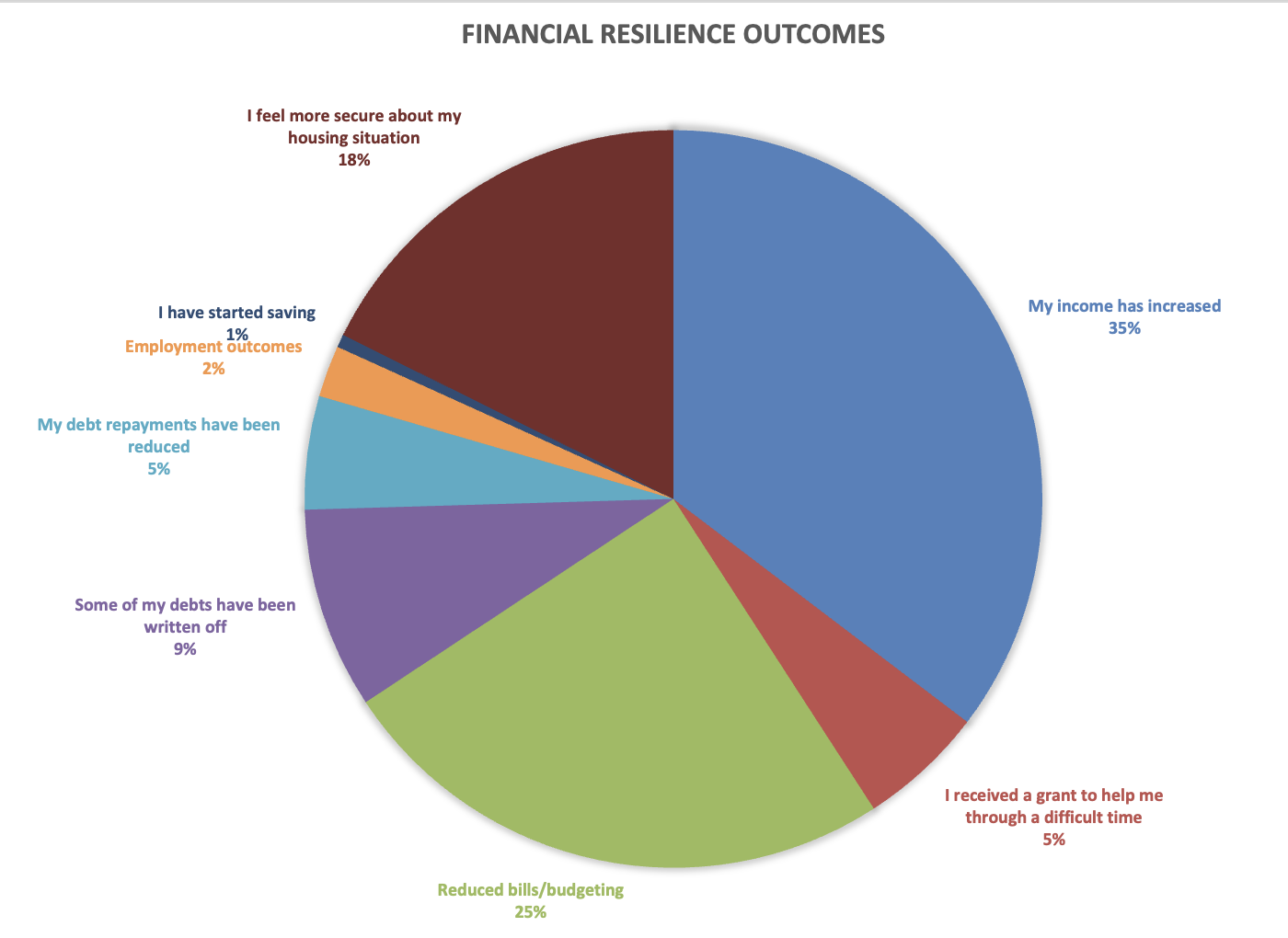
Overall, 88% of respondents feel they have at least one measure of improved financial resilience (205 clients responded to the financial resilience questions). The largest areas are increased income and reduced bills or improved ability to budget. This is reflective of the increasing amount of work we are undertaking around financial capability in addition to the income maximisation work we have traditionally carried out. It is also pleasing to see that 18% of the respondents felt increased security of housing tenure after receiving advice from us.
There is now a small number of clients reporting employment outcomes as a result of our work. This is made up of people moving into employment or securing a better paid job. These outcomes are achieved through our financial resilience projects and especially those funded by the UK Shared Prosperity Fund where we have developed strategic partnerships with local employment and skills providers.
Client quotes
“Citizens Advice have given me confidence that I am able to get help with my struggles. I don’t feel as isolated anymore. They helped me to understand what’s available in my situation.”
“Super service, thank you.”
“Really helpful, stopped me feeling so anxious, I would recommend everyone gets advice as soon as they need it.”
‘I was ignored before coming to Citizens Advice Beeston and felt isolated. I am glad citizens advice cater for all people in their community, all races and religions.’
Stakeholder impact
In carrying out our work it is important that we make a positive contribution to the improvement of all services in Central Nottinghamshire. We work with our partners in health, local government and the voluntary sector to deliver a joined up approach to how services are delivered that increases capacity and benefits the populations of Ashfield, Broxtowe and Newark & Sherwood.
Every year we carry out a stakeholder survey to measure how we are doing and learn from the feedback. This year we received responses from all of the sectors described above with 90% of respondents stating they know about our work either very well or a fair bit about our work. Only 10% said they know a little.
When measuring effectiveness as a communicator 81% said that they were satisfied or very satisfied.
Most importantly, all of the respondents said that we help them to achieve their strategic goals.

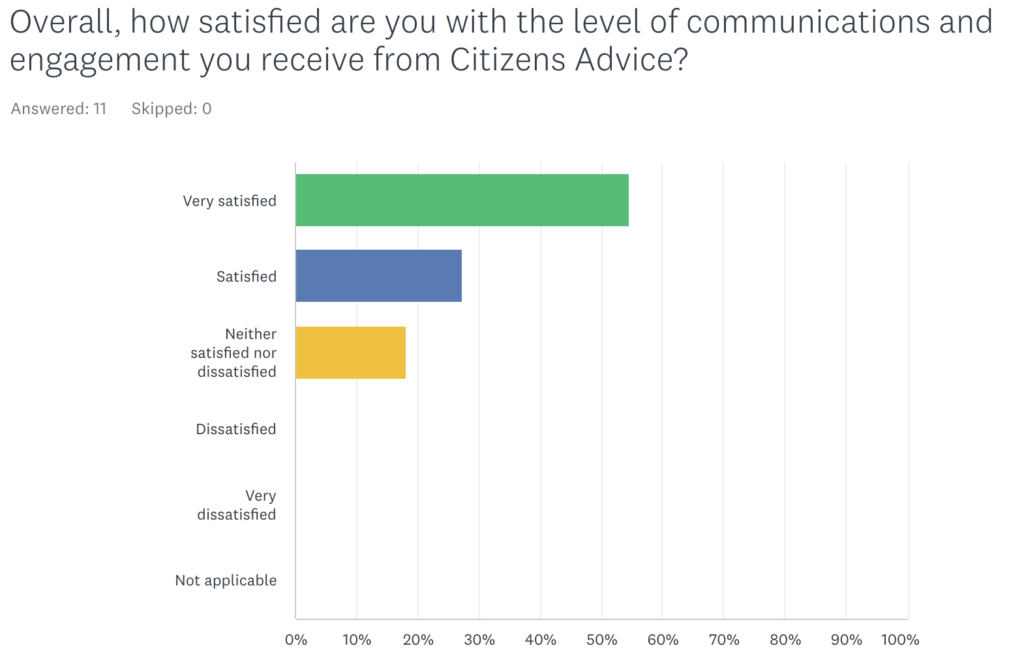
Stakeholder quotes included:
“The can do approach and willingness to support the local community.”
“So many things, you measure outcomes superbly well, you make a huge difference to individual lives, you are professional and treat us as a funding partner with respect. You are creative, innovative and flexible in responding to the needs of local people.”
“Ease of access and the support offered.”
These are glowing responses but we also recognise that our resources present limitations to how much we can be out and about in the community. There were a couple of comments asking for us to attend more community events and extend our outreach programme. One stakeholder commented:
“Come and work from our local hub (anonymised)”
We have to ensure that our advice workers can justify attendance at events in terms of number of clients reached as demand is so high at our core offices. This means that sometimes we say no, even to the most values partners but we are always seeking to sustain our outreach services and ensure that all community partners have a referral access route for their beneficiary’s needing advice.
Client case study

Andrew (name changed), our client from Ashfield made national news when Citizens Advice picked up his story as part of the ‘Living on Empty’ campaign. Andrew was on a negative budget. Once he’s paid for essentials like rent, energy bills and food he was £75 in deficit each month.
This was in part due to deductions from Universal Credit (UC) which occurred after an advance payment was made, something that is common in the UC application process. He also has reduced housing payments due to under occupancy.
After making an emergency referral to the local food bank our advice worker set about helping Andrew to reduce his bills. We applied to the Severn Trent Big Difference Scheme for a reduction in his water charges, applied to the local authority for a discretionary housing payment to cover part of his housing payment shortfall and made an application to the Scottish Power Hardship Fund for help with energy debts.
We then advised Andrew about social tariffs to reduce his broadband and communications costs.
Andrew has now been referred to our Financial Resilience Worker to look at a longer term plan to improve his financial wellbeing and possibly some support from our partners Futures who will advise him on employment and skills opportunities.
Our social value
Our social value is not only measured by the outputs and outcomes we achieve for our clients. We are also a business attracting £923,305 of grants and contracts in addition to our core funding from local government. We could not achieve this without the core funding that gives us a secure platform from which to develop our services and seek additional funding to meet the needs of our clients.
This also means that we employ a full time equivalent of 40 staff
We should also not forget the value of our volunteers. With 70 volunteers giving on average six hours of their time each week for free we estimate this provides a value of £303,379 per year.
